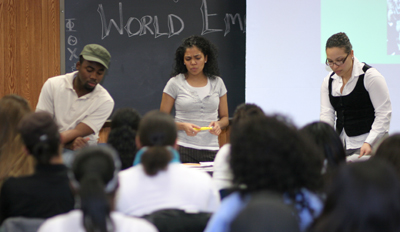
Two student groups, Phi Theta Chi Sorority, Inc. and the African Student Organization, presented a forum on the world emergency in Darfur on Monday.
The moderators, in an effort to create awareness and spark discussion of the genocide in Africa, presented a hard-hitting lecture and video and posited thought-provoking questions to the 40-person audience.
‘As women of color it’s our responsibility to inform everybody of Darfur,’ said Maryurin Torres, president of Phi Theta Chi (PTC), a sorority that bases itself ‘on the Latino racial trilogy ‘ Indigenous, European and African.’
‘We descended from Africans. We are facing a genocide that’s affecting our own people,’ she said.
Torres lead the meeting along with PTC philanthropy chair Rosa Mercedes and ASO parliamentarian Frank Okyere.
‘We want to educate people,’ said Okyere. ‘We want to let people know the issues going on around the world.’
ASO holds meetings on Monday nights, in which they discuss the situation of Africa and its diaspora and solutions to its problems.
The presentation elucidated the complicated conflict by providing the definitions, background, statistics, politics and obstacles to ending the devastation.
Midway through the forum, the moderators put on a documentary on the Darfur crisis produced by the U.N. Office for Coordination of Humanitarian Affairs. In the video, victims described the horrors perpetrated by the Janjaweed, the so-called Arab nomadic tribal groups sponsored by the Sudanese government to rape, kill and burn African tribal groups.
The targeted violence has led to the destruction of villages and severing of drinking water sources. Some pregnant women have even suffered laceration of their uterus; the perpetrators wanted to kill the fetus in case it was a male.
For freshman premed student Kayoll Galbraith, the video was the most powerful part of the meeting. ‘Seeing how this genocide is affecting the children. Seeing them walking in the desert with wind blowing dust in their faces, their bodies looking weak,’ she said.
‘It’s unfortunate.’
The disaster has stolen the lives of 200,000 to 450,000 and displaced up to 2.5 million people.
Yet, according to the forum, the people haven’t received adequate medical attention and the region hasn’t received proper political intervention. The disparity of help given to the region in turmoil was a focal point of the discussion Monday night.
‘Why did [the] United States intervene in 1945, but not now?’ Mercedes asked, referring to the United States’ role in ending the Holocaust.
‘[The] U.S. is not going to get involved because they really don’t care,’ declared an audience member.
The analysis turned from the current problems to the future of the devastated area. ‘What’s in store for Darfur?’ Mercedes asked.
‘Should Darfur people wait on big organizations like the U.N. to get involved or should African organizations get involved first?’ Okyere posed. ‘What solutions can we come up with?’
While debate simmered as to what macroscopic political routes to take, one solution remained clear.
‘People can’t do anything unless they know about it,’ Torres said. ‘Tell your friends about it.’
For Torres, information sessions and discussions are ‘very necessary and should continue.’
‘The Union, the Pods ‘ it’s a luxury,’ Torres said. ‘We got to be aware of our surroundings because in the end of the day, it’s our world.’


